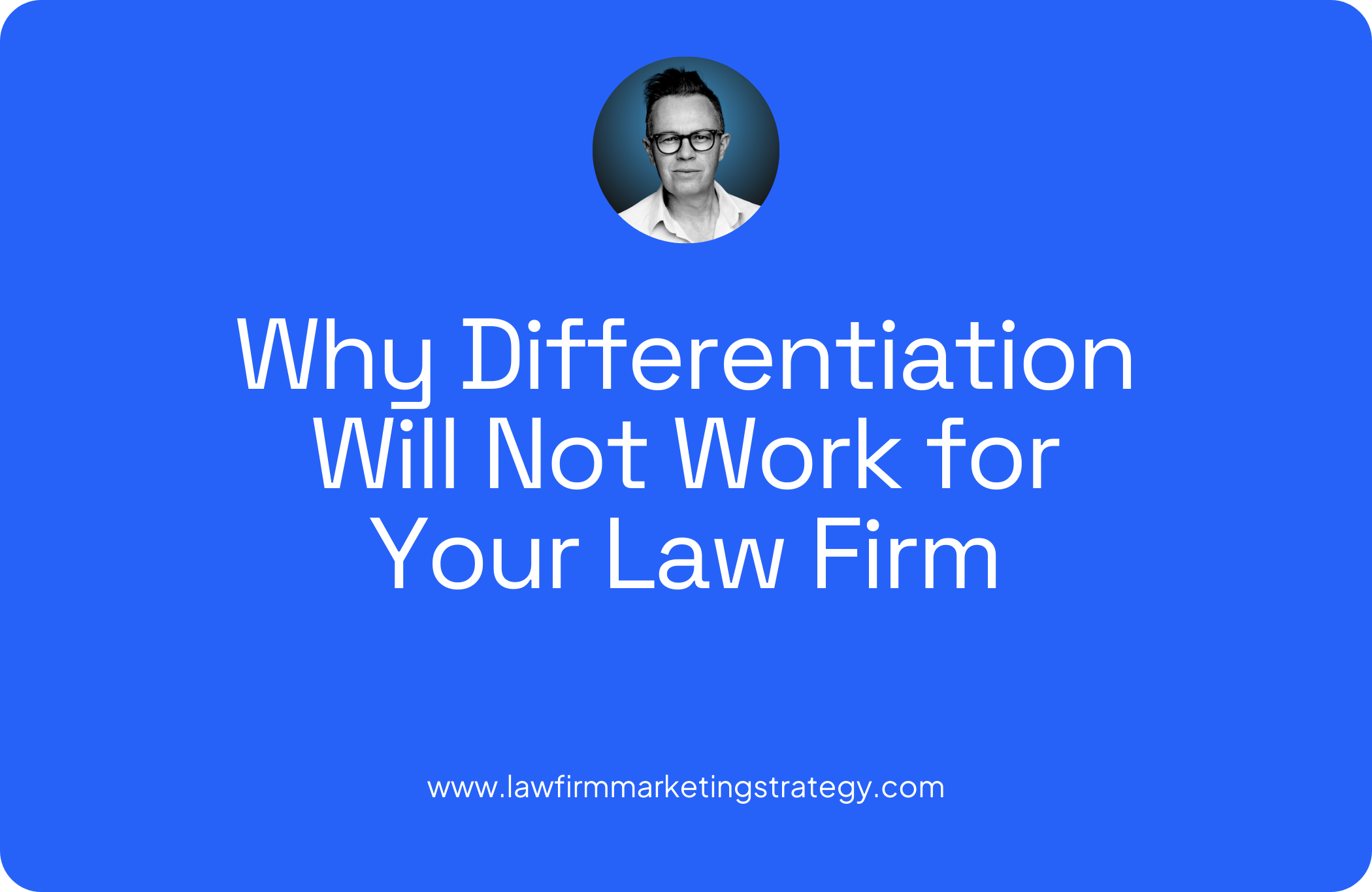
Let me save you hundreds of thousands in consulting fees and countless hours of painful strategic planning sessions: trying to differentiate your law firm is pointless. Not just pointless – it’s actually damaging your firm’s growth.
“But wait,” I hear you protest, “everyone knows we need to stand out from the crowd!”
Really? Let’s look at what the actual evidence tells us.
The Cold Hard Truth!
Thomson Reuters’ 2023 State of the Legal Market Report reveals a rather awkward truth: while 96% of law firms raised their rates based on their supposed “unique value proposition,” realisation rates continue to decline. Translation? Clients aren’t buying your differentiation story.
Even more telling, Altman Weil’s “Law Firms in Transition” survey shows 59% of law firms report chronic underperformance in their differentiation efforts. Yet – and this is the truly staggering part – 72% of these same firms list “differentiation” as a strategic priority for the coming year.
Einstein defined insanity as doing the same thing repeatedly and expecting different results. Welcome to the insane world of law firm differentiation.
The Science Behind Why You’re Wrong
Let’s turn to the evidence. Byron Sharp’s groundbreaking research in “How Brands Grow” demolishes the differentiation myth with brutal efficiency. His empirical studies show three uncomfortable truths:
- Brands compete through mental and physical availability, not differentiation
- Most customers see competing brands as similar
- Brand growth comes from penetration, not differentiation
Field and Binet’s research delivers an even more devastating blow to the differentiation fantasy. Their analysis of professional services shows brand building is twice as important as short-term activation. Yet what are law firms doing? Exactly the opposite – throwing money at tactical differentiation while ignoring long-term brand building.
The Evidence Is Embarrassing
Let’s look at what’s actually happening in the legal market. Thomson Reuters’ 2023 Report delivers three brutal truth bombs:
First, despite dumping mountains of cash into differentiation strategies, profit per equity partner declined 3.8% across the AmLaw 200. That’s right – the more firms tried to differentiate, the less money they made.
Second, demand for legal services dropped 0.1% despite firms’ desperate attempts to stand out. Apparently, clients aren’t impressed by your claims of being “client-focused” or offering “innovative solutions.”
Third, collection realization rates remained flat at 89.1%. Translation? Clients aren’t buying your premium positioning.
But surely clients care about how different you are? Wrong again. Clio’s 2023 Legal Trends Report shows:
- 76% of consumers find lawyers through their personal networks (not your clever differentiation strategy)
- 57% care more about how quickly you respond than your “unique approach”
- Only 28% even bother reading your differentiation statements
The Market Reality You’re Ignoring
Byron Sharp’s research proves markets follow scientific laws, not marketing fantasies. These laws apply to law firms just as surely as they apply to soap powder:
Double Jeopardy Law: Smaller firms have fewer buyers who are less loyal. No amount of differentiation will change this mathematical reality.
Law of Customer Acquisition: Growth comes from gaining new customers, not convincing existing ones you’re different.
Natural Monopoly Law: Mental and physical availability drive market share. Not your claimed differences. Not your values. Not your “unique” approach.
Field and Binet’s research hammers this home. Their data shows:
- 60% of business impact comes from broad reach
- 40% from targeted activation
- A big fat zero from claimed differentiation
What Actually Works
The Altman Weil survey shows the firms actually succeeding are focusing on:
- Geographic presence (being there)
- Practice area coverage (being available)
- Market presence (being remembered)
- Brand recognition (being known)
Notice what’s missing from this list? Any mention of differentiation.
The Path Forward
So what should you do instead of wasting time and money on pointless differentiation? The research points to three evidence-based strategies:
Build Distinctive Assets
Sharp’s research proves you need:
- Consistent visual branding (that you stick to)
- Memorable firm names (that you don’t keep changing)
- Distinctive brand assets (that you actually use)
Focus on Mental Availability
Field and Binet’s data shows you must have:
- Consistent market presence (not just when you’re desperate for work)
- Broad reach communication (not just targeted Meta posts)
- Regular brand building (not just tactical sales activation)
Ensure Physical Availability
Thomson Reuters data confirms you need:
- Multiple office locations (where your clients are)
- Diverse practice areas (that your clients need)
- Accessible service delivery (when your clients want it)
The Evidence-Based Action Plan
Here’s what the data says you should do:
Stop Wasting Money on Differentiation
The Altman Weil survey shows firms waste 28% of their marketing budget on failed differentiation efforts. Think what you could do with that money if you actually spent it on something that works.
Invest in Distinctive Assets
Field and Binet’s research shows distinctive assets deliver:
- 13% higher market share
- 27% better profit margins
- 37% stronger price premium
Double Down on Availability
Thomson Reuters data proves firms with better availability achieve:
- 16% higher utilisation rates
- 23% better realisation
- 31% stronger client retention
The Brutal Conclusion
The evidence is irrefutable: differentiation in legal services is a failed strategy. It’s time to stop pretending otherwise.
Instead of wasting another minute in workshops trying to articulate your “unique value proposition,” focus on what actually works:
- Building distinctive assets
- Maintaining consistent presence
- Ensuring broad availability
The great irony? The firms that stop trying to be different often end up being the most successful. They focus on being memorable, being available, and being consistent.
So the next time a consultant suggests you need to differentiate your firm, show them the door. You’ve got better things to do with your time and money.
